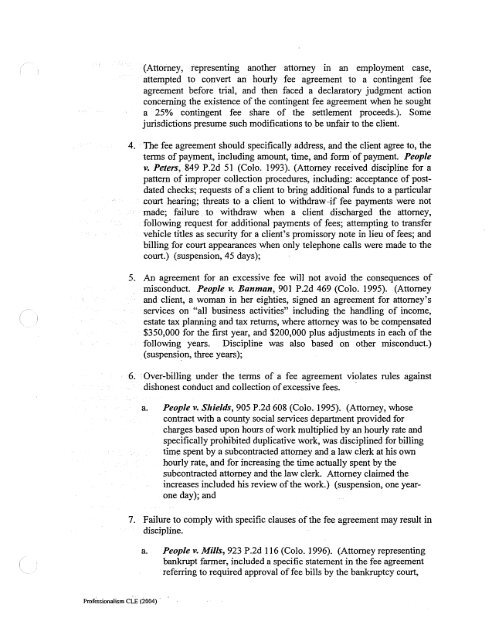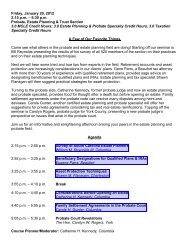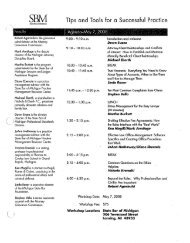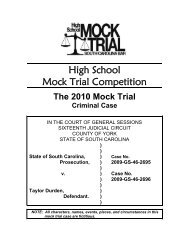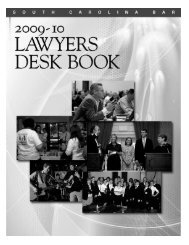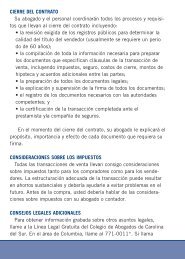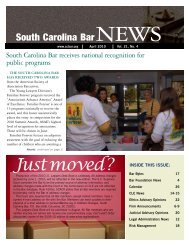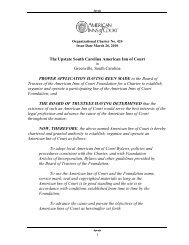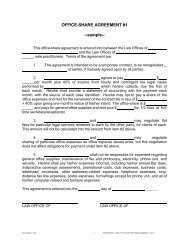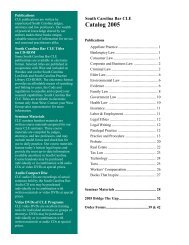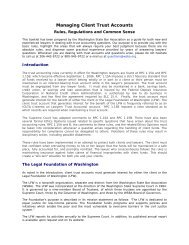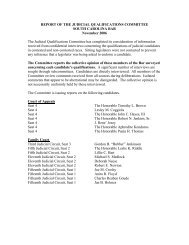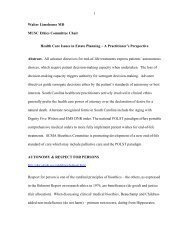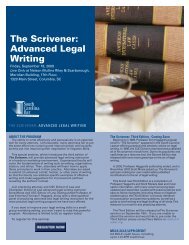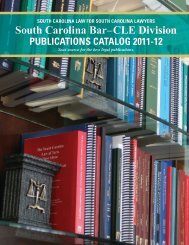Practicing With Professionalism - South Carolina Bar Association
Practicing With Professionalism - South Carolina Bar Association
Practicing With Professionalism - South Carolina Bar Association
You also want an ePaper? Increase the reach of your titles
YUMPU automatically turns print PDFs into web optimized ePapers that Google loves.
(Attorney, representing another attorney in an employment case,<br />
attempted to convert an hourly fee agreement to a contingent fee<br />
agreement before trial, and then faced a declaratory judgment action<br />
concerning the existence of the contingent fee agreement when he sought<br />
a 25% contingent fee share of the settlement proceeds.). Some<br />
jurisdictions presume such modifications to be unfair to the client.<br />
4. The fee agreement should specifically address, and the client agree to, the<br />
terms ofpayment, including amount, time, and form" ofpayment. People<br />
v. Peters, 849 P.2d 51 (Colo. 1993). (Attorney received discipline for a<br />
pattern of improper collection procedures, including: acceptance of postdated<br />
checks; requests of a client to bring additional funds to a particular<br />
court hearing; threats to a client to withdraw-·if fee payments were not<br />
made; .failure to withdraw when a client discharged the attorney,<br />
following request for additional payments of fees; attempting to transfer<br />
vehicle titles as security for a client's promissory note in lieu of fees; and<br />
billing for court appearances when only telephone calls were made to the<br />
court.) (suspension, 45 days);<br />
5. An agreement for an excessive fee will not avoid the consequences of<br />
misconduct. People v. Banman, 901 P.2d 469 (Colo. 1995). (Attorney<br />
and client, a woman in her eighties, signed an agreement for attorney's<br />
services on "all business activities" including the handling of income,<br />
estate tax planning and tax returns, where attorney was to be compensated<br />
$350,000 for the first year, and $200,000 plus adjustments in each of the<br />
following years. Discipline was also based on other misconduct.)<br />
(suspension, three years);<br />
6. Over-billing under the terms of a fee agreement violates rules against<br />
dishonest conduct and collection ofexcessive fees.<br />
a. People v. Shields, 905 P.2d 608 (Colo. 1995). (Attorney, whose<br />
contract with a county social services department provided for<br />
charges based upon hours ofwork multiplied by an hourly rate and<br />
specifically prohibited duplicative work, was disciplined for billing<br />
time spent bya subcontracted attorney and.a law clerk at his own<br />
hourly rate, and for increasing the time actually spent by the<br />
subcontracted attorney and the law clerk. Attorney claimed the<br />
increases included his review ofthe work.) (suspension, one yearone<br />
day); and<br />
7. Failure to comply with specific clauses ofthe fee agreement may result in<br />
discipline.<br />
a. People v. Mills, 923 P.2d 116 (Colo. 1996). (Attorney representing<br />
bankrupt farmer, included a specific statement in the fee agreement<br />
referring to required approval offee bills by the bankruptcy court,<br />
<strong>Professionalism</strong> eLE (20()4)


